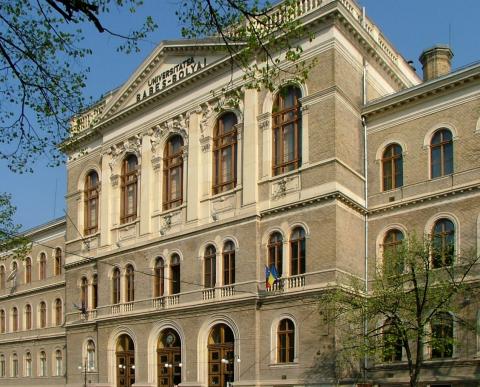Babeş-Bolyai University, Faculty of Physics
Institute

Babeş-Bolyai University
Street Mihail Kogalniceanu, No. 1
400084 Cluj-Napoca
+40 (264) 405328
+40 752 406628

Babeş-Bolyai University
Street Mihail Kogalniceanu, No. 1
400084 Cluj-Napoca
+40 (264) 405328
+40 752 406628
The Babeş-Bolyai University (Romanian: Universitatea Babeş-Bolyai [′babeƪ ′bojɒ.i], commonly known as UBB) is a public research university located in Cluj-Napoca, Romania. It was created from a 1959 merger of Bolyai University (founded in 1945) and Victor Babeş University (founded in 1919), whose histories can be traced to the Jesuit Academy of Kolozsvár, founded in 1581. It occupies the first position in the University Metaranking, initiated by the Romanian Ministry of Education and Research in 2016.
Babeş-Bolyai University is the largest Romanian university with about 50,000 students. It offers study programmes in Romanian, Hungarian, German, English, and French (as well as a smaller number of programmes at the Master's level taught in Spanish, Italian, and Japanese). The university was named, following the fusion in 1959 of the Romanian and Hungarian-language universities in Cluj, after two prominent scientists from Transylvania, the Romanian bacteriologist Victor Babeş and the Hungarian mathematician János Bolyai. It is one of the five members of the Universitaria Consortium , a group of elite Romanian universities, including
University Alexandru Ioan Cuza,
the Academy of Study Economics,
and University of the West Timisoara.
UBB is affiliated with the International Association of Universities, Guild of European Research-Intensive Universities, Eutopia, the Santander Group, the Agence universitaire de la Francophonie and the European University Association. Likewise, UBB signed the Magna Charta Universitatum and concluded partnerships with 210 universities in 50 countries, and it is widely considered one of the most prestigious in Eastern Europe. The BabeÈ™-Bolyai University is classified as an advanced research and education university by the Ministry of Education.
Physics means "nature" in the Greek language also because it deciphers the mysteries of this world, from quarks to the stars; it remains the queen of sciences. The Faculty of Physics proposes to open up a new perspective on the role of physics and of a physicist in our current world.
The Faculty of Physics offers undergraduate programmes of 3 years in the following specialisations: Physics, Medical Physics, Computational Physics, and of 4 years in Technological Physics. After obtaining an undergraduate degree, students can opt for one of the master's specialisations of the faculty of two years in the following fields: Solid Body Physics, Biophysics and Medical Physics, and Computational Physics. Fields of doctoral studies at the Faculty of Physics: Atom and Molecule Physics, Condensed Matter Physics, Theoretical Physics, Biophysics.
Currently, the Faculty of Physics owns high-performance research and specialized laboratories. Here, both teaching and research activities are conducted. Our students work in laboratories alongside academics and researchers in order to prepare their final undergraduate paper, dissertation or doctoral thesis. Ioan Ursu Institute of Physics plays an important role in research, and it has been functioning since 1963. Initially established as a research laboratory in the field of magnetic resonance, it has developed over time, and nowadays, it has several centres and research laboratories which have been engaged in high-level scientific activities, reflected in numerous publications in journals and numerous research grants won in domestic and international competitions.

